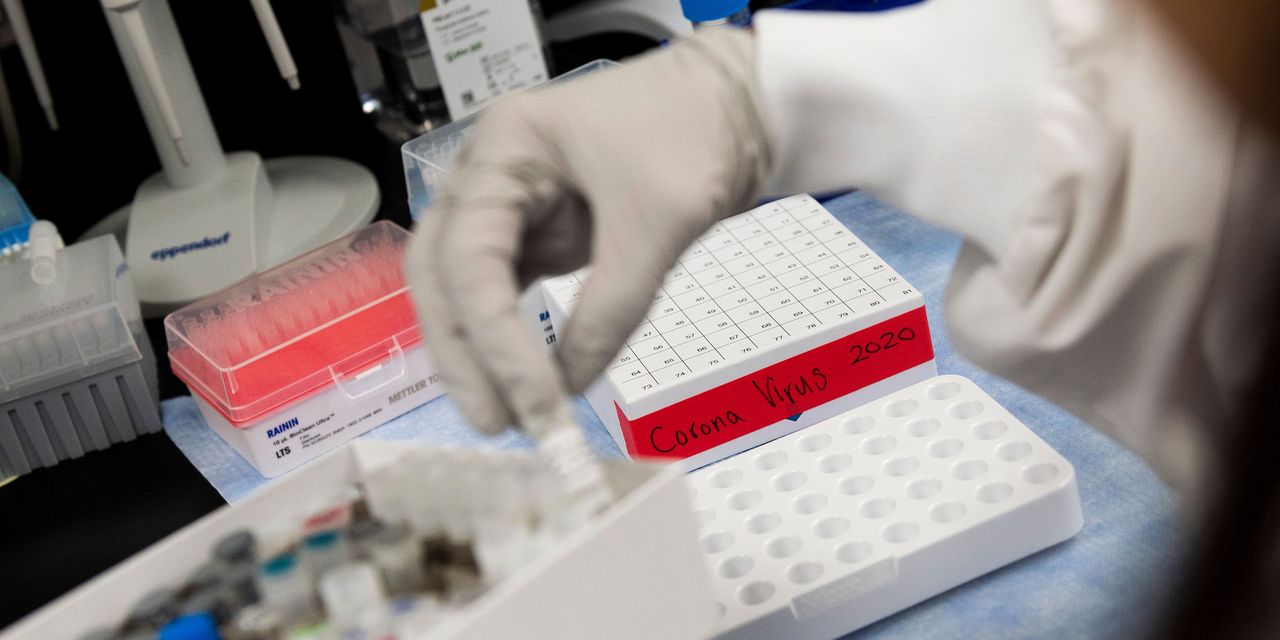The Food and Drug Administration’s vaccines advisory panel backed
Novavax
’s
long-delayed Covid-19 vaccine, saying the benefits outweighed the risks.
The stock was rising 17% to $55.60 in premarket trading Wednesday.
The panel voted Tuesday 21 to zero in favor of the proposition that the vaccine’s benefits outweighed its risks, with one abstention. The panel, however, expressed disappointment that more data wasn’t available on the vaccine’s efficacy against more recent variants of the virus.
It’s now up to the FDA to decide whether to authorize the vaccine on an emergency basis.
All signs point to the FDA giving the vaccine the nod. In comments made early in Tuesday’s meeting, the director of the FDA’s Center for Biologics Evaluation and Leadership, Dr. Peter Marks, said that there is a significant need for a Covid-19 vaccine in the U.S. not based on a messenger RNA approach.
“Having a protein-based alternative may be more comfortable for some, in terms of their acceptance of vaccine,” Marks said, referring to the more traditional vaccine modality that Novavax (ticker:
NVAX
) used. “We do have a problem with vaccine uptake that is very serious in the United States, and anything that we can do to get people more comfortable to be able to accept these potentially lifesaving medical products is something we feel we are compelled to do.”
Trading in Novavax shares was halted Tuesday in anticipation of the vote. This year, shares are down more than 65%. The stock fell 20% on Friday after documents released by the FDA in advance of the meeting raised concerns that FDA staff were opposed to the drug’s authorization. Those concerns appear to have been baseless, though Novavax’s ride during the meeting wasn’t without its bumps.
Novavax first presented promising efficacy data on its Covid-19 vaccine in early 2021. Delays have plagued the company. While billions of Covid-19 shots have been administered around the globe, Novavax says that 744,000 doses of its vaccine have been administered as of the end of April.
At the Tuesday meeting, the FDA presented an analysis showing that the Novavax vaccine demonstrated 90.4% efficacy in participants over aged 18. Collection of data for the study, however, ended in September, before the emergence of the Omicron variant.
“It’s a little hard to draw any conclusions as to how it would perform against Omicron,” said Dr. Ofer Levy, a temporary voting member of the committee and a professor at the Harvard Medical School, at the meeting.
Concerns about myocarditis, an inflammation of the heart, were a focus during the meeting. The agency said that of 40,000 vaccine recipients in the Novavax safety database, six had reported myocarditis or a related condition, pericarditis. Myocarditis has also been observed in people who have received messenger RNA-based Covid-19 vaccines from
Pfizer
(PFE) and
Moderna
(MRNA).
In a statement, Novavax said that, across all its placebo-controlled studies, the rate of myocarditis was equivalent between the vaccine and placebo. One committee member, Dr. Paul Offitt, a professor of pediatrics at the Children’s Hospital of Philadelphia, asked whether it was something about Covid-19 vaccines targeting the spike protein in general, or the vaccine delivery systems themselves, that were causing myocarditis “It’s incumbent upon us to know this, to know whether it’s about the protein itself, or whether it’s about the way the protein is being processed, so we can use that knowledge to make safer vaccines for a disease that is going to be with us for decades, if not longer,” Offitt said.
In a presentation, Dr. Lucia Lee of the FDA’s Office of Vaccines Research and Review noted that the effectiveness against the currently circulating variants of the virus remained uncertain. In comments at the meeting, committee members said that they wished that more recent data on the vaccine was available.
Rubin, speaking toward the end of the meeting, said the data presented looked similar to the data the same committee saw when first reviewing the Pfizer and Moderna vaccines in late 2020. “If we’re going to use the same criteria that we did then, I think it’s not that difficult a decision,” Rubin said. “It is disappointing … that we don’t have more updated information, because we’re looking at the efficacy against strains that don’t exist any longer.”
Late in the meeting, Dr. Henry Bernstein, a committee member and a professor of pediatrics at the Zucker School of Medicine, asked Novavax what took the company so long to complete the submission of their emergency-use application. ”What really took the longest time … was the generation of the assays demonstrating that we could make the product over and over again the same way, and deploying those assays,” Novavax’s chief medical officer, Dr. Filip Dubovsky said.
—Sabrina Escobar contributed to this article
Write to Josh Nathan-Kazis at [email protected]



